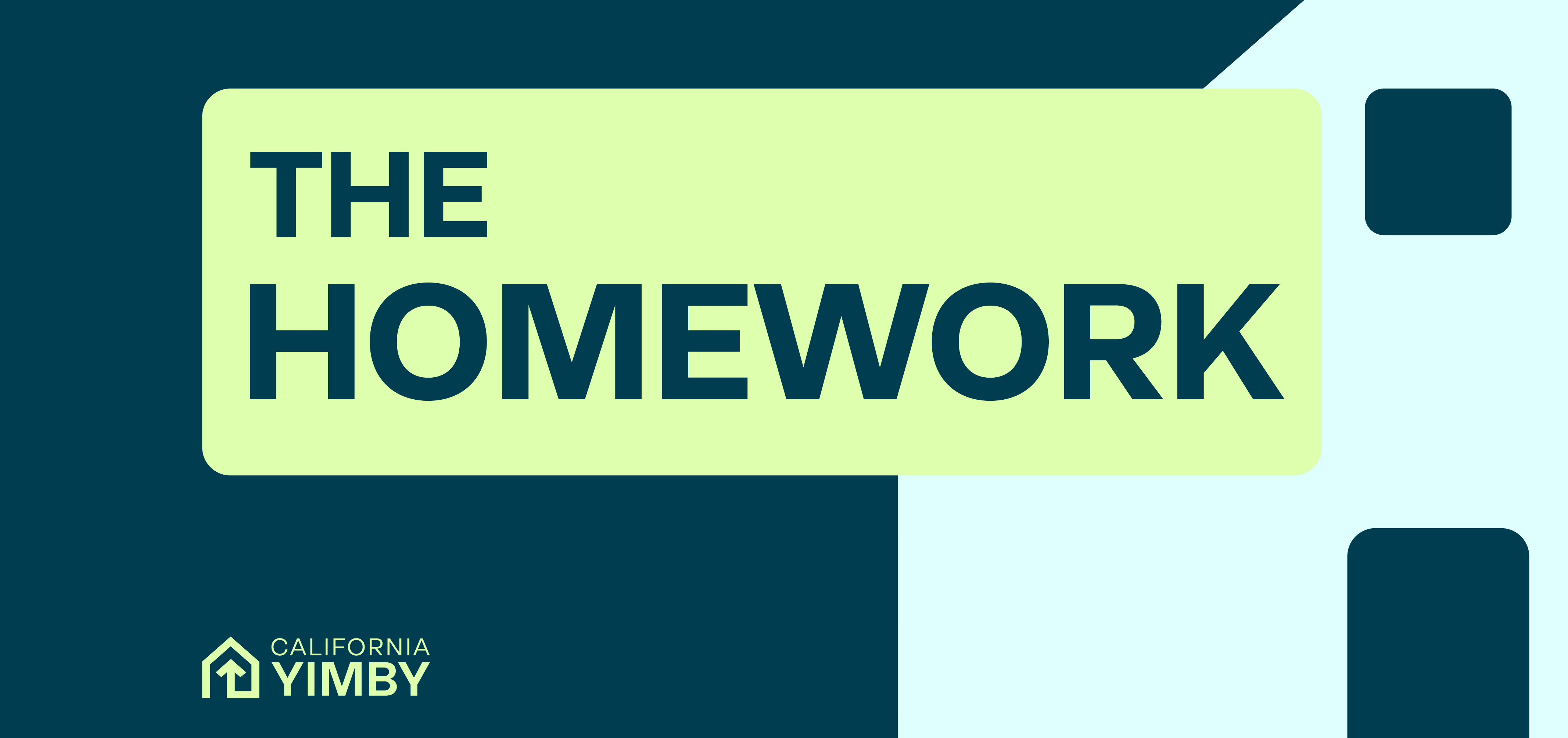The Homework: May 10, 2024

Welcome to the May 10, 2024 Main edition of The Homework, the official newsletter of California YIMBY — legislative updates, news clips, housing research and analysis, and the latest writings from the California YIMBY team.
News from Sacramento
The legislature has wrapped up its first round of policy committees, and all bills with a fiscal cost attached are now in their respective appropriations committee.
The following California YIMBY sponsored and high-priority bills are in the appropriations committee:
Sponsored Bills:
- SB 1123 (Caballero): This bill updates SB 684 (2023) to make it legal to build up to 10 homes on single-family zoned vacant lots.
- AB 1820 (Schiavo): This bill will require cities to provide a precise estimate of the fees required for a proposed housing development at the time of building permit application.
- AB 2580 (Wicks): This bill will require local governments to monitor how new historic designations could impact their ability to meet housing needs under existing state law, and report new historic buildings and districts to the California Department of Housing and Community Development (HCD) during the Annual Progress Report of the Regional Housing Needs Assessment process.
High Priority Bills:
- SB 1462 (Glazer): This bill will reduce financing costs and risks for new condominium projects by allowing developers to use deposits made by buyers during the pre-sale process to cover construction costs.
- AB 2144 (Grayson): This bill will reduce uncertainty around new home building by requiring local governments to provide evidence in their Annual Progress Reports, required by the state’s Regional Housing Needs Assessment, that they are complying with existing laws regarding transparency in impact fees.
California YIMBY also has sponsored and high-priority bills that are going straight to the Senate Floor due to Senate Rule 28.8, which allows bills to be sent directly to the Senate Floor for second reading if the Senate Appropriations Chair determines that the bill’s costs are not significant.
Sponsored Bills:
- SB 937 (Wiener): This bill will authorize deferrals of impact fees and extends entitlements in order to provide developers tools to pencil out projects.
- SB 1211 (Skinner): This bill will encourage more ADUs on multifamily properties by providing more flexibility around how ADUs can be built alongside existing multifamily housing.
High Priority Bills:
- SB 1210 (Skinner): This bill will help to eliminate uncertainty around utility connection fees by requiring that fees are clear, transparent, and posted online.
Lastly, our sponsored bill AB 3057 (Wilson, a technical fix to an existing law that will grant local Junior ADU ordinances the same exemption from environmental review that is already granted to standard ADU ordinances, recently passed the Assembly Floor and is making its way to the Senate side.
The suspense hearing for the Assembly and Senate Appropriations Committee is expected to be on May 16th. Suspense hearings determine which bills make it out of appropriations, are amended, or will be held in committee.
To stay current on what housing bills California YIMBY is sponsoring, supporting, and watching, you can now use our Abstract link to track with us.
Stay tuned to future editions of The Homework, and follow the California YIMBY Twitter channel, @cayimby, to stay up to date on developments on the legislative session and related news.
Housing Research & Analysis
The Homevoter Hypothesis: A New Generation Gap?
We know that older people vote more than younger people and that homeowners vote more than renters; but are older homeowners, as a class, overrepresented in local elections? Katherine Levine Einstein, Maxwell Palmer, Ellis Hamilton, and Ethan Singer analyzed the intersections of age, race, home tenure, and election scheduling to find out, publishing their findings as The Gray Vote: How Older Home-Owning Voters Dominate Local Elections.
Key takeaways
- Older homeowners are dramatically overrepresented in all elections in every one of the 500 cities in their sample.
- Their overrepresentation increases significantly in “off-cycle” elections for local office that are not held in conjunction with a Presidential or midterm election.
- The ten percentage point gap between Black and White voter participation essentially disappears among older homevoters, with older White homeowners only two percentage points more likely to vote than older Black homeowners.
Does Walkability Make Us Happier?
Does living in a walkable neighborhood make people happier? Kevin M. Leyden, Michael J. Hogan, Lorraine D’Arcy, Brendan Bunting, and Sebastiaan Bierema investigate the “linkages between place, health, and happiness in younger and older adults” in their paper Walkable Neighborhoods.
Key takeaways
- Walkability is directly linked to the happiness of people aged 36 to 45.
- The happiness effects of walkability are somewhat limited for younger and older adults.
- Older adults living in walkable neighborhoods were more likely to feel healthy and trusting of others, which positively affected their happiness.
Houser Headlines
- California Housing Is Even Less Affordable Than You Think, UC Berkeley Study Says | KQED
- Working Group: More Entry-Level Homes Could Help Solve Housing Crisis – The Sacramento Observer
- Senate Bill 9 hits a legal road bump – Orange County Register
- After deadly shooting, farmworker housing plans stall in Half Moon Bay
- Allstate Will Insure California Homes Again, Under One Condition
- ADU coastal zoning loophole ‘pitting neighbor against neighbor’ – The San Diego Union-Tribune
- Affordable housing at the expense of existing tenants? L.A. council seeks new protections
- California has to rid itself of a ‘no’ mentality to change its relationship with cars
- These California taxes could be overturned by ballot measure before state Supreme Court
- California’s insurance crisis is rattling the real estate market. It could impact ‘almost every sale’
YIMBY Social – Top Posts

Share the good word
We welcome your ideas and feedback — send story tips and ideas to Homework@cayimby.org.